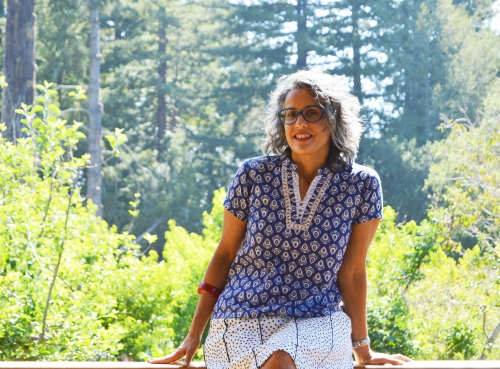Campus News
Year-long UC Santa Cruz seminar to examine global migration and non-citizenship
The phenomena of global migration, disenfranchisement, and hardships of living in territories while not holding traditional citizenship will be examined in a year-long seminar conceived by five UC Santa Cruz professors and funded with a grant from the Andrew W. Mellon Foundation.

The phenomena of global migration, disenfranchisement, and hardships of living in territories while not holding traditional citizenship will be examined in a year-long seminar conceived by five UC Santa Cruz professors and funded with a grant from the Andrew W. Mellon Foundation.
“The movement of people is one of the most pressing issues of our time,” the five professors outline in their proposal. The seminar is titled “Non-citizenship” and is planned by Catherine Ramírez, Latin American and Latino studies; Juan Poblete, literature; Felicity Amaya Schaeffer, feminist studies; Sylvanna Falcón, Latin American and Latino studies; and Steve McKay, sociology.
Open to the campus and community, the seminar “intends to foster a dialogue about belonging and rights, to shed light on the historical development of the category of the noncitizen, and to produce knowledge for a world being remade by human mobility.” The seminar will launch May 6-7, 2016 with “Keywords in Migration Studies,” an international conference at UC Santa Cruz.
The proposal won a $175,000 grant under the Mellon Foundation’s John E. Sawyer Seminars on the Comparative Studies of Cultures. Named for the foundation’s third president, Sawyer Seminars were established in 1994 to provide support for comparative research on the historical and cultural sources of contemporary developments. The award is one of 11 Sawyer Seminars funded this year and is a first for UC Santa Cruz.
Migration is a global issue not limited to cross-border travel in North and Central America. Witness Africans migrating to Europe, Iraqis and Syrians moving to Lebanon and Turkey, Haitians in the Dominican Republic.
The seminar will look at what modern citizenship means “in a world of citizens and non-citizens, such as undocumented immigrants, guest workers, permanent residents, refugees, asylum seekers, and those who are stateless.”
Among its questions: “What happens when non-citizens are prohibited from becoming citizens? And what are the rights and obligations of denizens, citizen and non-citizen alike?”
The term “denizen” is used to describe an inhabitant who is not a formal citizen but not an “illegal” immigrant either. Often, denizens are barred from becoming citizens, Ramirez said. Free and enslaved blacks were denizens before the 14th Amendment to the Constitution was ratified in 1868.
Today’s denizens include foreign workers holding H-1B visas in Silicon Valley; Somalis, Salvadorans, and Liberians who are unable to return to their homelands because of armed conflict, environmental disaster, or life-threatening pandemic. They also include undocumented youth who arrived in the U.S. younger than age 16 and who are temporarily exempt from deportation under the auspices of the 2012 executive action Deferred Action for Childhood Arrivals.
Ramirez said the seminar seeks to bring together scholars and cultural workers from a variety of disciplines and fields to imagine fresh ways of thinking about the growing global issue of non-citizenship in the 21st century.